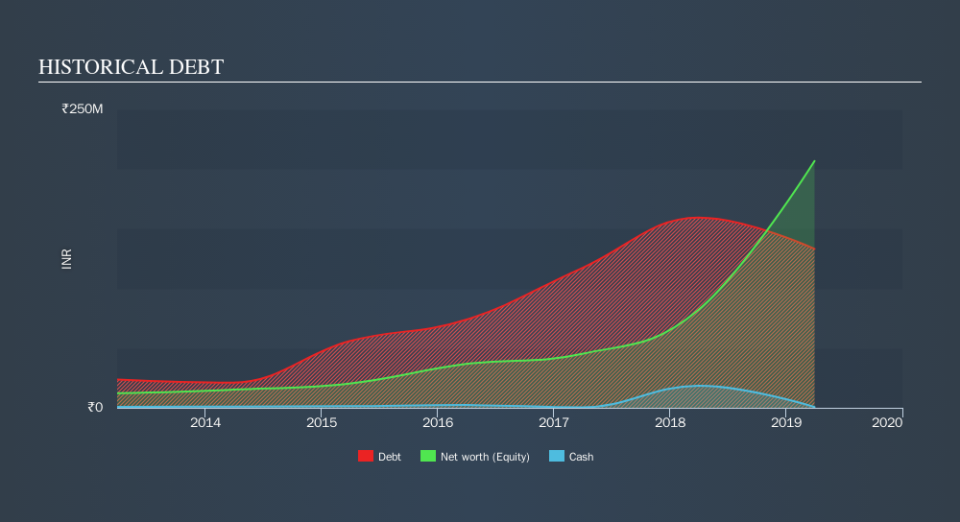Does Bombay Super Hybrid Seeds (NSE:BSHSL) Have A Healthy Balance Sheet?

Warren Buffett famously said, 'Volatility is far from synonymous with risk.' So it might be obvious that you need to consider debt, when you think about how risky any given stock is, because too much debt can sink a company. We note that Bombay Super Hybrid Seeds Limited (NSE:BSHSL) does have debt on its balance sheet. But should shareholders be worried about its use of debt?
What Risk Does Debt Bring?
Debt and other liabilities become risky for a business when it cannot easily fulfill those obligations, either with free cash flow or by raising capital at an attractive price. In the worst case scenario, a company can go bankrupt if it cannot pay its creditors. While that is not too common, we often do see indebted companies permanently diluting shareholders because lenders force them to raise capital at a distressed price. Having said that, the most common situation is where a company manages its debt reasonably well - and to its own advantage. The first step when considering a company's debt levels is to consider its cash and debt together.
Check out our latest analysis for Bombay Super Hybrid Seeds
What Is Bombay Super Hybrid Seeds's Net Debt?
As you can see below, Bombay Super Hybrid Seeds had ₹133.1m of debt at March 2019, down from ₹159.4m a year prior. Net debt is about the same, since the it doesn't have much cash.
How Strong Is Bombay Super Hybrid Seeds's Balance Sheet?
According to the last reported balance sheet, Bombay Super Hybrid Seeds had liabilities of ₹147.1m due within 12 months, and liabilities of ₹31.0m due beyond 12 months. On the other hand, it had cash of ₹687.7k and ₹30.3m worth of receivables due within a year. So its liabilities outweigh the sum of its cash and (near-term) receivables by ₹147.1m.
Given Bombay Super Hybrid Seeds has a market capitalization of ₹804.4m, it's hard to believe these liabilities pose much threat. However, we do think it is worth keeping an eye on its balance sheet strength, as it may change over time.
We measure a company's debt load relative to its earnings power by looking at its net debt divided by its earnings before interest, tax, depreciation, and amortization (EBITDA) and by calculating how easily its earnings before interest and tax (EBIT) cover its interest expense (interest cover). The advantage of this approach is that we take into account both the absolute quantum of debt (with net debt to EBITDA) and the actual interest expenses associated with that debt (with its interest cover ratio).
Bombay Super Hybrid Seeds has a debt to EBITDA ratio of 3.1 and its EBIT covered its interest expense 5.1 times. Taken together this implies that, while we wouldn't want to see debt levels rise, we think it can handle its current leverage. One way Bombay Super Hybrid Seeds could vanquish its debt would be if it stops borrowing more but continues to grow EBIT at around 18%, as it did over the last year. When analysing debt levels, the balance sheet is the obvious place to start. But it is Bombay Super Hybrid Seeds's earnings that will influence how the balance sheet holds up in the future. So when considering debt, it's definitely worth looking at the earnings trend. Click here for an interactive snapshot.
Finally, a business needs free cash flow to pay off debt; accounting profits just don't cut it. So we clearly need to look at whether that EBIT is leading to corresponding free cash flow. Over the last three years, Bombay Super Hybrid Seeds saw substantial negative free cash flow, in total. While investors are no doubt expecting a reversal of that situation in due course, it clearly does mean its use of debt is more risky.
Our View
Bombay Super Hybrid Seeds's struggle to convert EBIT to free cash flow had us second guessing its balance sheet strength, but the other data-points we considered were relatively redeeming. For example, its EBIT growth rate is relatively strong. We think that Bombay Super Hybrid Seeds's debt does make it a bit risky, after considering the aforementioned data points together. That's not necessarily a bad thing, since leverage can boost returns on equity, but it is something to be aware of. Above most other metrics, we think its important to track how fast earnings per share is growing, if at all. If you've also come to that realization, you're in luck, because today you can view this interactive graph of Bombay Super Hybrid Seeds's earnings per share history for free.
At the end of the day, it's often better to focus on companies that are free from net debt. You can access our special list of such companies (all with a track record of profit growth). It's free.
We aim to bring you long-term focused research analysis driven by fundamental data. Note that our analysis may not factor in the latest price-sensitive company announcements or qualitative material.
If you spot an error that warrants correction, please contact the editor at editorial-team@simplywallst.com. This article by Simply Wall St is general in nature. It does not constitute a recommendation to buy or sell any stock, and does not take account of your objectives, or your financial situation. Simply Wall St has no position in the stocks mentioned. Thank you for reading.


